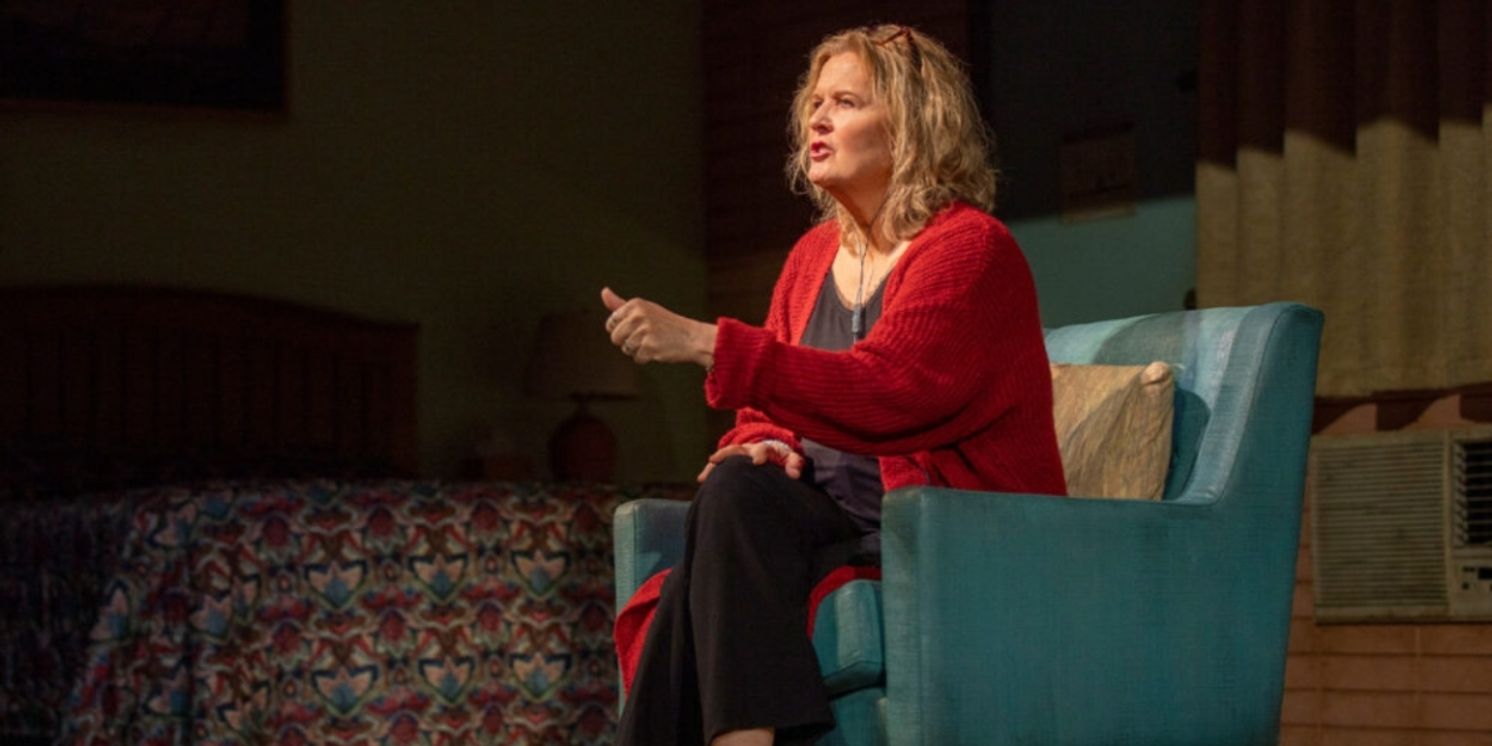Review: DANA H. at Factory Theatre
Lip-synced true crime drama tells all

When the lights come up on the Crow’s Theatre production of Lucas Hnath’s DANA H. at Factory Theatre, actress Jordan Baker sits centre stage in what looks like a modestly-appointed Florida motel room. Her round metal bracelets jangle on her wrists as she adjusts a body mike, ready to be interviewed by an unseen voice.
But when she opens her mouth, the voice we hear isn’t hers; it’s the voice of Hnath’s mother, Dana Higginbotham, recorded in a series of interviews with Steve Cosson and cut together by playwright Hnath and sound designer Mikhail Fiksel to form a lip sync track. Dana herself speaks her truth as she remembers it, which in this case is definitely stranger than fiction.
In 1997, while her son was in college, after years of ushering some souls on to the next life and keeping others in this one as a hospital chaplain and counsellor, she was kidnapped by a psychiatric patient who used and abused her as a sort of comfort item, a plush toy manhandled until the stitches pop and the stuffing gives way. Her kidnapper was a suicidal man fresh out of jail and never fully out of the Aryan Brotherhood, a Nazi-worshipping gang that rules the US prison system and has tendrils throughout the country.
Dana’s story is painful and suspenseful, though we know she’s here to tell it. It’s hard to listen to, but it’s impossible to look away. Fashioning the show as halfway between an interview and a performance is a fascinating and disorienting technique; it puts the experience in a liminal space between the two, allowing the viewer just enough distance to stomach Dana’s terror and self-flagellation. The staging, too, adds to this liminal feeling; not only is a motel a classic liminal space of “passing through,” but the set feels carved out of the theatre like a diorama under tilt-shift photography, life-sized yet strangely miniaturized, framed by Paul Toben’s supertitles that explain to us the play’s premise and what section of it we’re in.
Faced with an unusual acting task, Baker is dynamite in her solo turn. It’s not an easy thing to exactly embody another person’s affect, even if you’re not technically speaking and spend most of the play sitting in one place. In fact, in its Broadway production, the play’s two 2022 Tonys were for its lead actress and sound design, testifying to both the difficulty of creating a memorable character with these constraints and the bizarre alchemical magic that occurs when an actor is able to work in perfect synchronization with another’s voice and mannerisms, with no room for error, for more than just a three-minute Drag Race clip.
Baker portrays Dana with a world-weary face and no-nonsense demeanour that matches her dialogue; sometimes, she chews out the words as though their content has turned them to broken glass in her mouth. She’s aided by costume designer Janice Pytel’s smart use of those multiple jangling bracelets, almost the only sound unmediated by the recording, which always brings us back to the reality of the person on stage.
Hnath, well known for such theatrical experiments as A Doll’s House: Part 2 and A Public Reading of an Unproduced Screenplay About the Death of Walt Disney (the latter soon to arrive on Toronto stages via Outside the March), effectively blurs boundaries between the reality of his mother’s testimony and the surreality of seeing it represented on stage. Just like there’s a slight jolt every time you remember that no actual sound is coming out of the actress in front of you despite how natural the performance looks, there’s a slight jolt every time you remember that this is the voice and remembered experience of the playwright’s mother, and that, before her son arranged the series of interviews (deliberately not remaining present to ease his mother’s stress), he and his mother had never really talked about the months-long saga that he didn’t witness.
Knowing that Hnath learned the details of the events much like we do, by listening to taped interviews, and then cut them into a clearer narrative for us to witness, adds to the viewing experience. The playwright here is an intermediary to his mother’s perspective, which is often hazy and potentially unreliable; she doesn’t completely know exactly what happened during those terrifying months—except for certain moments which are described with horrifying clarity—but she does know she endured all of it to avoid retaliation against her son.
It’s good that Dana’s tale is so engaging, because the staging itself is largely static, meaning that most of the visuals we have to go on are micromovements, punctuating the text like the consistent beep that marks a cut from one portion of an interview to another. When things do shift and director Les Waters' production makes full use of Andrew Boyce’s scenic design and Paul Toben’s lighting, it’s an eerie surprise.
Dana’s narrative never falls into melodrama, despite the subject matter; she’s warm but guarded, cynical but compassionate, darkly humourous but hurting. What stands out is the constant commentary on the fallibility or even poisonously corrupt nature of authority figures and systems, Dana being failed by her parents, her church, and the police in turn as she’s blamed for being victimized in various ways. Throughout this tale of bitter disappointment remains a single thread of hope: hope that everything is not lost, so long as a single person believes you.
Believe Me, Dana telegraphs desperately—to her interviewer, to her son, and, indirectly, to an audience of strangers. Her need to be heard suffuses everything. It’s written in the manuscript she nervously clutches. It’s in those bracelets, jangling to the tune of her fraying nerves. It’s in her eyes as she stares straight ahead, recounting scenes it took a quarter-century to talk about.
And she says it all without an actress saying a word.
(Photo by John Lauener)
Reader Reviews
Videos

